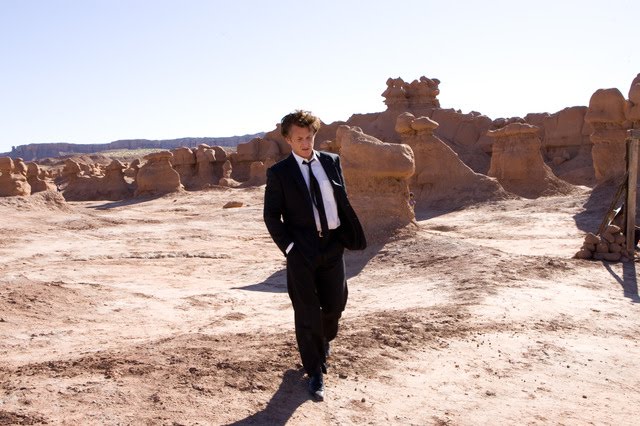Culture
A rootless “Tree of Life”

The Tree of Life
dir. Terrence Malick
Release Date: Jun 03, 11
- 1
- 2
- 3
- 4
- 5
- 6
- 7
- 8
- 9
- 10
By now you’re probably pretty familiar with reclusive writer/director Terrence Malick’s The Tree of Life. The delayed release. The confounding trailer. The booing and subsequent victory at Cannes. But despite the mystery, the controversy, and the Palme d’Or, the question remains: Will it live up to the ridiculously high expectations? For many, it has. For me, it has not.
The plot of this movie centers on a family living in Waco, Texas in the 1950s, one of the sons of said family grappling with life and death many years later, and the very formation of the earth itself. This is the first problem with Tree. Not only is it incredibly schizophrenic in its narrative, but it takes pride in confusing its audience. When a filmmaker makes you question what’s happening up on screen for the purpose of furthering your emotional and intellectual experience, it can be a work of beauty. But when a filmmaker makes you question what you’re seeing simply for the sake of making you do so, there is nothing more pretentious or arrogant.
One gets the sense that Malick is trying to do the former, but the film feels helplessly stuck in the latter. Because of this, it’s hard to make a genuine emotional connection with anything that goes on in Tree. Rather than a poet, Malick comes off as a conceited magician, attempting to show us tricks that will make us say, “What just happened?” rather than cause us to ponder the actual nature of what it was that we saw. In the end, the whole thing feels like a giant sleight-of-hand, rather than a true story.
Perhaps this is missing the point, because story was clearly the last thing on Malick’s mind when he set out to make this film. This isn’t necessarily a problem. Many directors, some lesser and some greater than Malick, have succeeded before in providing the audience with a visual poem, rather than a focused narrative. However, Malick’s issue is that he doesn’t really do either. He tries to combine both approaches, and ends up with results that are unfortunate, to say the least. Again, he’s not the first to do it, and the most logical comparison to The Tree of Life, which many people observed before the film was even out, is 2001: A Space Odyssey. In that film, Kubrick too sought to weave in and out of story and sensory experience., but he did it with focus. He established a flow from beginning to end, knowing when to evenly crescendo and diminish.
Next to Kubrick, Malick seems more interested in making noise than in crafting an actual symphony. The creation scenes at the beginning are ridiculously long, so much so that it’s hard to even care about the story of this 1950s family by the time that the film gets there. And then there’s the plotline of Jack, the family’s eldest son, played as an adult by Sean Penn, who’s barely even in the film. The older Jack pops in an out, floating in between life and death, fantasy and reality. Presumably he’s there to tie everything together, but his scenes are ultimately so few that the character feels like nothing more than an afterthought. It’s this meandering that takes away any sense of pacing from Tree, and which ultimately takes away so much of the effect Malick wanted to leave us with.
There are, of course, some indisputably good things about this movie. Brad Pitt, as Mr. O’Brien, the patriarch of this Texas family, is excellent. He alternates between love and fear when interacting with his three boys, and although you’re never quite sure of his character, you are sure of the fierce conviction Pitt has given him every time he appears onscreen. And then there’s newcomer Hunter McCracken, as the young Jack. If there’s a true star in this movie, it’s him. He conveys both the wonder and uncertainty of childhood in a way that is at once naturalistic and nuanced. If Malick had truly set out to make a coming-of-age story centered on Jack’s entering into self-realization, this movie might’ve been quite strong. Whereas 2001 seeks to explore the wonders of the cosmos, Tree supposes that there’s something beyond that cosmos. But in many ways, the film is best when it’s not trying to be 2001, and looks instead at the smaller details that make up our collective humanity.
But unfortunately, the strengths of The Tree of Life also help to highlight its weaknesses. Sure, there are a few intimate moments, but in the end they’re overshadowed by a plethora of ridiculously long, special effects-driven sequences, depicting the creation of the world and the vastness of death. Malick devotes adequate time to neither grace nor nature; in fact, he doesn’t really devote adequate time to anything. Instead, he jumps around awkwardly, as if he’s trying to give clarity to the film’s ideas, but is only able to hide behind the artistic beauty for which he’s known. There’s so much going on here, it’s as if it wants to be a movie about everything, and in its confusion ends up being about nothing.
Malick grew up in Waco, Texas during the ‘50s himself, and one can only assume he drew on aspects of his actual childhood while crafting Tree. However, in focusing on every lofty idea he could get his hands on, he looses all sense of the personal. His vision here was indeed stunning, but unfortunately his ambition got in the way. When it’s all said and done, The Tree of Life is a film that poses many questions, but answers few.
Pingback: Do312 Blog()